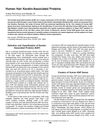Biomarkers of Alopecia Areata Disease Activity and Response to Corticosteroid Treatment
December 2015
in “
Experimental dermatology
”
TLDR Corticosteroid treatment reduces inflammation and alters hair keratins in alopecia areata.
The study investigated biomarkers of alopecia areata (AA) disease activity and response to corticosteroid treatment in 6 patients with patchy AA. Immunohistochemistry and gene expression analysis of scalp biopsies revealed increased inflammatory markers and immune cells in pretreatment lesional scalp, which decreased after treatment. Significant increases in Th1, Th2, IL-23, and IL-32 cytokine pathways were observed in lesional scalp, with notable downregulation of IL-12/IL-23p40, CCL18, and IL-32 post-treatment. Additionally, several hair keratins were downregulated in lesional scalp but upregulated after treatment. The findings highlighted the concurrent activation of Th1 and Th2 immune axes and identified response biomarkers to corticosteroid injections, suggesting the need for clinical trials with selective antagonists and cytokine-pathway biomarkers to further understand pathogenic immunity in AA.






